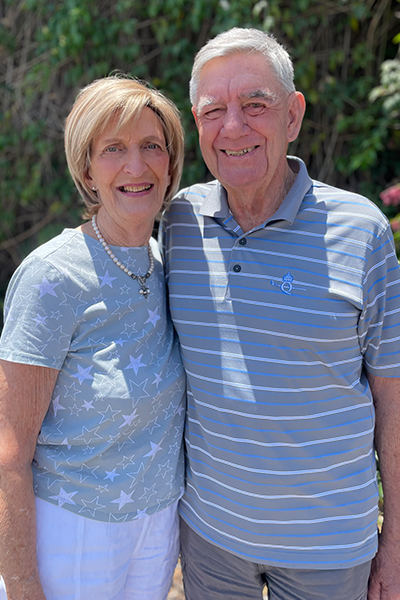CHAT program is a "stroke of genius!" for John and Bridget

John and Bridget
Husband and wife duo of 53-years John and Bridget Noble are some of Metro North Health's Comprehensive High-dose Aphasia Treatment (CHAT) program's biggest advocates, following John's stroke event in February 2021..
At 79-years-old, John was playing tennis, working and living a mentally and physically active life, until one morning he fell off the bed at 3.15am and began displaying symptoms that warranted a trip to his local hospital, The Prince Charles Hospital.
Tests and scans revealed a clot in John's brain. Transferring to Royal Brisbane and Women's Hospital on the same day, clot retrieval proved to be too difficult and dangerous, leaving doctors no choice but to let the stroke complete.
"When John had his stroke, the severity was evident; he had no alphabet, no numbers, no time, no understanding of his life or who he was, the only thing he could say was 'yes' and smile," Bridget said.
The stroke had affected the left-hand side of John's brain, leaving him with aphasia, a language disorder that affects a person's ability to express and understand written and spoken language, and some right-side mobility challenges.
Bridget made it her mission to better understand aphasia and what services were on offer to help John communicate again.
"I ordered 15 books from the internet, including one called Stronger After Stroke that I found particularly helpful," Bridget said.
"I would hold up the book and show him the title every day. I needed him to believe that we were doing something."
It wasn't until Bridget became aware of the CHAT program that their journey took a turn for the better with the offer of a deeply comprehensive understanding and treatment of aphasia.
CHAT was developed by Metro North Health, in partnership with The University of Queensland's (UQ) Queensland Aphasia Research Centre (QARC) which forms part of the clinical research services at STARS.
The program is delivered by speech therapists, with the support of aphasia researchers and involves patients participating in a 50-hour intense therapy program delivered over eight weeks.
"That program is the greatest thing that ever happened to me," John said.
"CHAT gave me the chance to be somebody and something again."
With a "stroke of genius" as Bridget refers to it, the pair have turned their pain into power and are now using their story to help others faced with aphasia by speaking at various conferences and events, in addition to working in a consumer advisory role within Metro North.
"John's stroke event has given us purpose to be a voice for everyone affected by aphasia," Bridget said.
